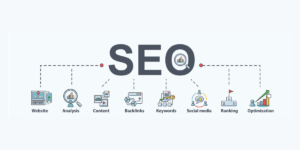
Few names resonate as profoundly as Google. Founded on September 4, 1998, by Larry Page and Sergey Brin while they were Ph.D. students at Stanford University, Google has evolved from a humble search engine into a multinational conglomerate, touching nearly every aspect of our digital lives. Tracing the history of Google unveils a fascinating journey marked by groundbreaking inventions, strategic acquisitions, and a relentless commitment to innovation.
Inception And Early Years
The story of Google begins in a cluttered Stanford dorm room, where Larry Page and Sergey Brin embarked on a mission to organize the vast expanse of information on the internet. Armed with their innovative PageRank algorithm, which prioritized search results based on relevance, they launched the precursor to Google, initially dubbed “BackRub.” The name eventually evolved into “Google,” a play on the mathematical term “googol,” representing the vastness of information they aimed to organize.
The Rise Of A Search Giant
In September 1998, Google was officially incorporated with a modest investment from Sun Microsystems co-founder Andy Bechtolsheim. The fledgling company quickly gained traction, attracting users with its simple interface and lightning-fast search results. By the early 2000s, Google had emerged as the dominant player in the search engine market, outpacing competitors like Yahoo! and AltaVista.
Expansion Beyond Search
Google’s ambitions extended far beyond search. In August 2004, the company shook the tech world with its initial public offering (IPO), raising $1.67 billion and solidifying its status as a powerhouse in the tech industry. With a war chest of capital at its disposal, Google embarked on a series of ambitious ventures, including the acquisition of YouTube in November 2006, marking its foray into online video streaming.
Diversification And Innovation
Throughout its history, Google has demonstrated a knack for innovation and diversification. The company introduced a slew of groundbreaking products and services, including Google Maps in February 2005, Gmail in April 2004, Google Docs in March 2006, and Android in September 2008, the world’s most popular mobile operating system. Google’s commitment to moonshot projects, such as Waymo, its self-driving car division, and Google X, its research and development lab, exemplifies its relentless pursuit of innovation.
The Alphabet Era
In August 2015, Google underwent a significant restructuring, establishing Alphabet Inc. as a conglomerate that served as the parent company of Google and its various subsidiaries. This restructuring allowed Google to focus on its core businesses, including search, advertising, and cloud computing, while enabling Alphabet to explore new ventures in industries such as healthcare, autonomous vehicles, and urban development.
Google Challenges And Controversies
Despite its meteoric rise, Google has faced its fair share of challenges and controversies. The company has come under scrutiny for its data privacy practices, antitrust concerns, and ethical implications of its AI technologies. In recent years, Google has made efforts to address these concerns, emphasizing transparency, accountability, and responsible AI development.

My name is Greg and I have 20 years of experience in creating and managing websites. I have 6+ million views collectively on social media platforms like Quora, Facebook, LinkedIn, and Instagram. Contact me to get your website optimized for search engines.











